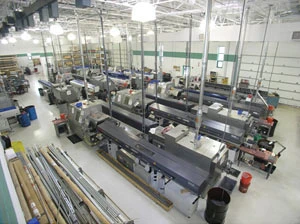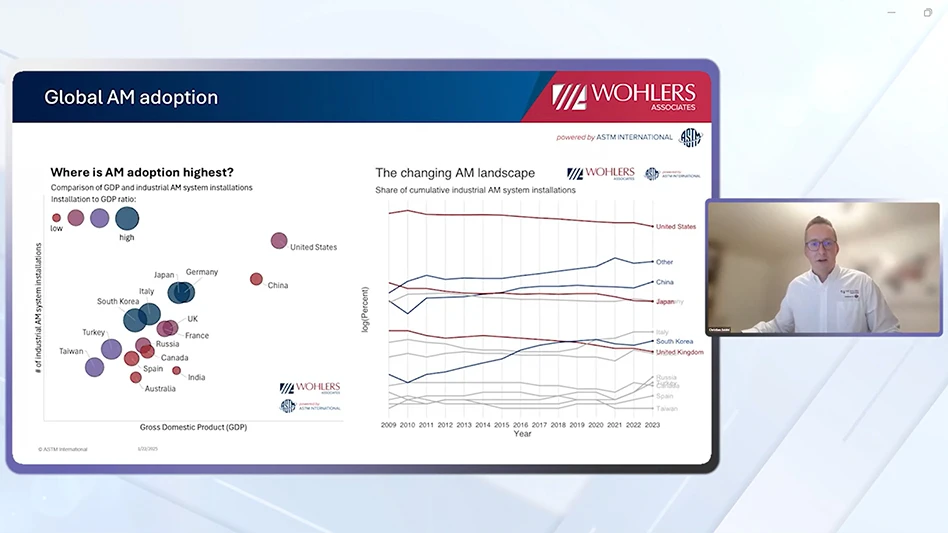
As part and product miniaturization continues, Swiss-style precision manufacturing can lower component cost, speed development and delivery, and boost quality and sales.
Hundreds of years ago, Swiss watch makers set the standard for precision and excellence in mechanical timepieces that are still the wonder of their age.
The Swiss brand, in fact, is so stellar that it is virtually synonymous with the concepts of tradition, precision craftsmanship, high technologies and continual innovation.
Today, the legacy of Swiss-style manufacturing lives on in the production and manufacture of small, precision parts by CNC Swiss screw machines.
These machines are capable of machining parts up to 1-1/4" diameter, with tolerances as low as 0.0001" in one operation.
These precision parts range from winding stems for watches to male/female pins, electronic connectors, dental implants, fasteners, and hydraulic valve components. Often used as internal components, they must be free of burrs, slivers or other surface imperfections because they often mate or interact with other parts in everything from cell phones, to surgical devices, to construction equipment.
"From medical implants and high tech avionics to optics, consumer electronics and green technology, the trend is toward lighter, stronger, more miniaturized components," says Ken Malo, president of Swiss Automation.
"This can require more demanding tolerances, surface finishes and exotic materials such as titanium and Inconel, which Swiss-style precision manufacturing can readily provide."
SWISS TRADITION
The connection to the tradition of Swiss manufacturing is not just in name alone. At Swiss Automation, a company that specializes in short run through full scale, long run production of precision parts, Malo prefers to run precision jobs on its 16 Tornos-Bechler DECO CNC Swiss screw machines, the only Swiss-made, Swiss-type screw machines on the market.
With a total of 90 CNC Swiss style screw machines, including Japanesemade Citizens and German-made Traubs, Malo's company has about ten times the number of CNC Swiss style screw machines as other typical Swiss style machine shops. This enables short lead times, quick turnaround, and the ability to do long runs.
In a rush job, the company once produced 1.5 million parts in less than three months.
Malo counts among his most trusted operators one of his first, longest tenured employees, who grew up in a family of Swiss watchmakers.
"My first employee is from Switzerland," Malo says. "He was a watchmaker.
His father was a watchmaker.
His grandfather was a watchmaker. He has been in the trade for 54 years, and has been with us continuously for 33 of those years." Although it was an unofficial apprenticeship, Malo spent five years in America and Switzerland learning the trade.
"This is not a trade you learn overnight," Malo explains. "You can take a cabinet maker by trade, for example, and retrain them as a precision machinist, but it takes years to really perfect the Swiss precision machining trade." Swiss-style precision manufacturing uses computerized numerical control (CNC) to machine high precision parts on Swiss screw machines. Because CNC Swiss screw machines have a sliding headstock, guide bushings and cross tools, they can produce tiny parts with exact tolerances and surface finishes. Since these advanced machines can turn bar stock in multiple axis points, a finished part can be produced with a single set-up, minimal labor and, most importantly, no secondary operations.
In contrast, traditional machining of complex parts is labor intensive and less precise - requiring multiple setups on multiple machines, shuttling the parts through a multitude of secondary operations such as tapping, milling or cross-drilling. This adds cost, chances for error, inconsistency in maintaining tolerances, and often weeks of production time, especially when work needs to be done at different facilities.
Since CNC Swiss screw machines are costly and require highly skilled operators, a growing number of proactive manufacturers from medical, aerospace and defense, to electronics, telecom, government, hydraulic and construction are looking to strategically outsource production of complex parts to optimize cost and workflow.
Endoplus, a Buffalo Grove, ILbased medical device manufacturer specializing in laparoscopic instruments, achieved success in outsourcing complex component production to Swiss Automation. "By switching to Swiss Automation as a part supplier, we reduced part cost by 48%; part variation by 76%; increased daily output of finished goods by 21%; and eliminated all scrap-related cost," says Tom Feldsien, director of product development for Endoplus. "After using their parts to enhance our flexible production capacity, we set a monthly invoicing record." While Endoplus has internal manufacturing capability, for higher production capacity it chose to strategically outsource the production of several laparoscopic instrument components to Swiss-style precision manufacturing.


Since then, outsourcing has grown to more than a dozen laparoscopic components, used in minimally-invasive abdominal surgery.
"Previously, we had multiple set-ups on multiple machines with multiple operators," Feldsien says. "By outsourcing to the multi-axis CNC Swiss screw machines, we streamlined operations and boosted quality." Since nearly all of Swiss Automation's 90 CNC Swiss screw machines have the ability to cross drill, tap, mill, polygon and C-axis, plus perform additional machining on the sub-spindle to complete a complex part in one operation, this enables complex parts to be machined without secondary operations. Compared to traditional machining, this speeds production and reduces the potential of human error by eliminating multiple set-ups and handling.
"We have measured just one part in 10 billion to be out-of-spec, a quality standard that is hard to match internally," Feldsien explains.
Compared to other machining operations, what makes such quality and efficiency possible is Swiss Automation's focus on purchasing the most advanced CNC Swiss screw machines available, and training its operators in a five-year European-style apprentice program, a training and work ethic widely acknowledged to be the most effective in the industry.
The ISO 9001:2000 certified company has averaged more than $2 million a year in new CNC Swiss screw machine purchases since 1998, with outdated and less capable machines sold to make room for the newest, latest and best available. Its operators are not only screened for mechanical aptitude before hire, but also rotated through inspection and operation with one-on-one instruction and mentoring from experienced operators and master set-up people. Its most proficient operators are promoted to set-up, being able to troubleshoot challenging jobs when they occur.
"By taking advantage of their investment in the latest CNC Swiss screw machine technology, we have been able to provide high precision parts to our customers far faster and less expensively than we could have internally," Feldsien says. "It has been one key to our rising sales, and helps us stay competitive in a weak economy." FASTER DESIGN AND DELIVERY Compressing design and delivery times was critical to Apollo Endosurgery, an Austin, TX-based leader in device and procedure development for a number of minimally-invasive surgeries.
However, in-house machining capacity and the lead times of traditional machine shops was insufficient.
"We needed precision part delivery within two weeks, but traditional machine shops were quoting six to eight weeks," says James Klein, an Apollo Endosurgery design engineer working on an endoscopic suturing system.
"We were at an impasse." Apollo Endosurgery turned to Swiss Automation, which was able to offer delivery of their needed precision components within two weeks.
With 24/7 production capability and 24-hour quote reply goal, the Swissstyle precision manufacturer collaborated with Apollo Endosurgery on every needed design change to speed development.
"Besides the multi-axis CNC Swiss screw machines, their one-stop capability for in-house CAD/CAM programming, in-house tool making, and in-house secondary department work can speed development and delivery," Klein says.
"Their precision work, fast lead times and willingness to accommodate us have helped to compress our design, prototype and test cycle so we can quickly identify the best designs, then ramp up production for the marketplace," Klein concludes.
With 90 CNC Swiss screw machines, 18 master set-up operators, nearly 50 apprenticed operators staffing three shifts, and six pre-production inspectors, Swiss Automation can expedite short and long runs from prototypes to multi-million-piece orders.
Swiss Automation Inc.
Barrington, IL
swissautomation.com
Tornos U.S.
Lombard, IL
tornos.us
Marubeni Citizen-Cincom Inc.
Allendale, NJ
marucit.com
Index Corp.
Noblesville, IN
index-usa.com

Explore the October 2009 Issue
Check out more from this issue and find your next story to read.
Latest from Today's Medical Developments
- Methods Machine Tools, Multiaxis, announce AI solution investment
- MGS to showcase global expansion and healthcare CDMO expertise
- Medtronic: 5 healthcare tech trends for 2025
- Norman Noble launches enhanced laser welding capabilities; expands micromachining in Florida
- What you need to know about CMMC requirements
- CO2 footprint of a machine tool
- Ainos unveils AI Nose for robotics
- Keep up with the latest in design and manufacturing through free webinar





